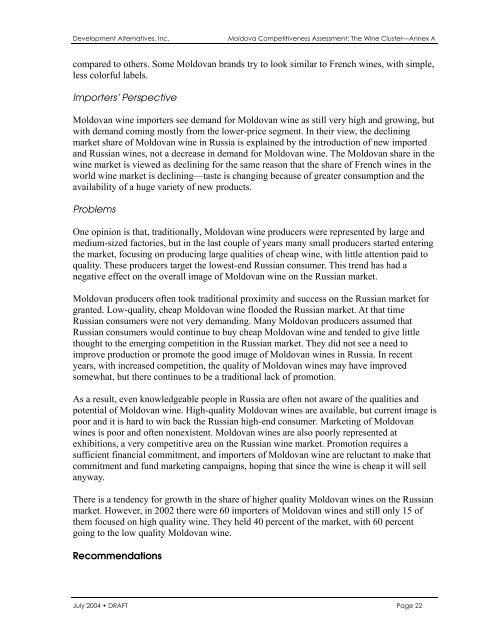Assessing Competitiveness In Moldova's Economy - Economic Growth
Assessing Competitiveness In Moldova's Economy - Economic Growth
Assessing Competitiveness In Moldova's Economy - Economic Growth
Create successful ePaper yourself
Turn your PDF publications into a flip-book with our unique Google optimized e-Paper software.
Development Alternatives, <strong>In</strong>c. Moldova <strong>Competitiveness</strong> Assessment: The Wine Cluster—Annex A<br />
compared to others. Some Moldovan brands try to look similar to French wines, with simple,<br />
less colorful labels.<br />
Importers’ Perspective<br />
Moldovan wine importers see demand for Moldovan wine as still very high and growing, but<br />
with demand coming mostly from the lower-price segment. <strong>In</strong> their view, the declining<br />
market share of Moldovan wine in Russia is explained by the introduction of new imported<br />
and Russian wines, not a decrease in demand for Moldovan wine. The Moldovan share in the<br />
wine market is viewed as declining for the same reason that the share of French wines in the<br />
world wine market is declining—taste is changing because of greater consumption and the<br />
availability of a huge variety of new products.<br />
Problems<br />
One opinion is that, traditionally, Moldovan wine producers were represented by large and<br />
medium-sized factories, but in the last couple of years many small producers started entering<br />
the market, focusing on producing large qualities of cheap wine, with little attention paid to<br />
quality. These producers target the lowest-end Russian consumer. This trend has had a<br />
negative effect on the overall image of Moldovan wine on the Russian market.<br />
Moldovan producers often took traditional proximity and success on the Russian market for<br />
granted. Low-quality, cheap Moldovan wine flooded the Russian market. At that time<br />
Russian consumers were not very demanding. Many Moldovan producers assumed that<br />
Russian consumers would continue to buy cheap Moldovan wine and tended to give little<br />
thought to the emerging competition in the Russian market. They did not see a need to<br />
improve production or promote the good image of Moldovan wines in Russia. <strong>In</strong> recent<br />
years, with increased competition, the quality of Moldovan wines may have improved<br />
somewhat, but there continues to be a traditional lack of promotion.<br />
As a result, even knowledgeable people in Russia are often not aware of the qualities and<br />
potential of Moldovan wine. High-quality Moldovan wines are available, but current image is<br />
poor and it is hard to win back the Russian high-end consumer. Marketing of Moldovan<br />
wines is poor and often nonexistent. Moldovan wines are also poorly represented at<br />
exhibitions, a very competitive area on the Russian wine market. Promotion requires a<br />
sufficient financial commitment, and importers of Moldovan wine are reluctant to make that<br />
commitment and fund marketing campaigns, hoping that since the wine is cheap it will sell<br />
anyway.<br />
There is a tendency for growth in the share of higher quality Moldovan wines on the Russian<br />
market. However, in 2002 there were 60 importers of Moldovan wines and still only 15 of<br />
them focused on high quality wine. They held 40 percent of the market, with 60 percent<br />
going to the low quality Moldovan wine.<br />
Recommendations<br />
July 2004 • DRAFT Page 22
















